Typing Right Blog
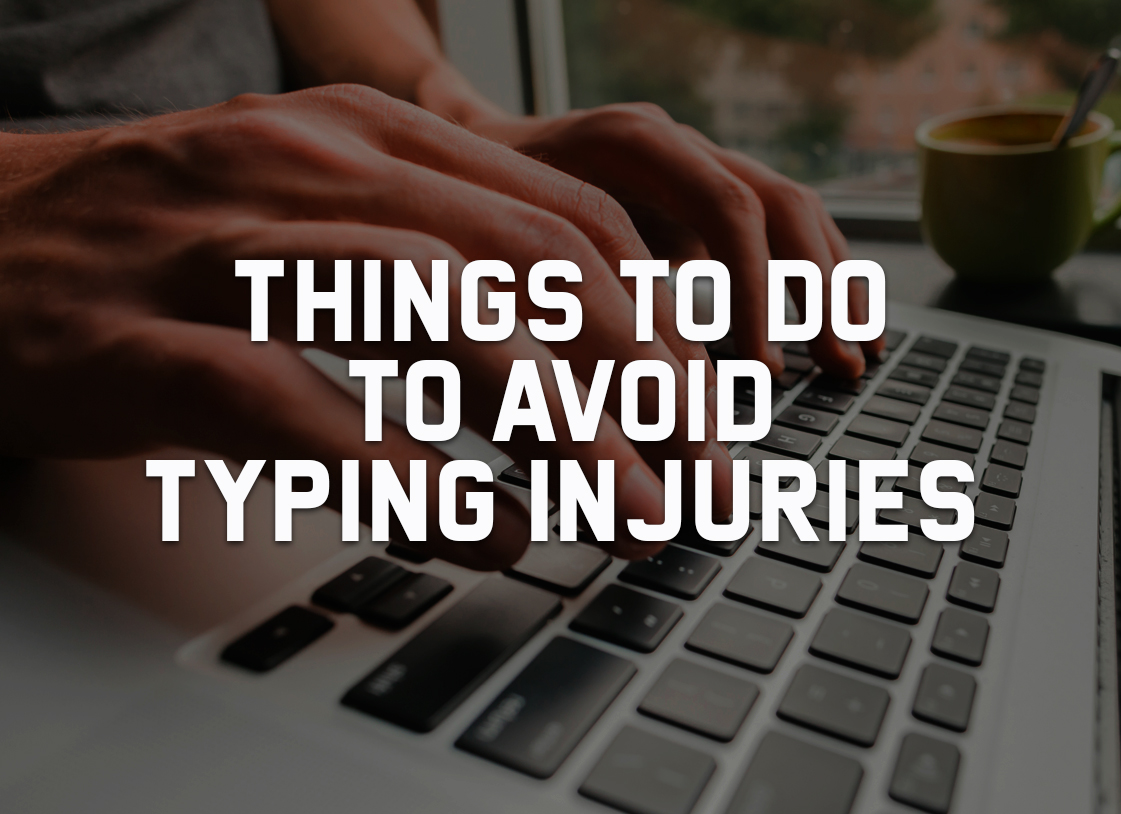
Things to Do to Avoid Typing Injuries
In today’s modern world, typing has become a fundamental skill to have. Whether you are a student, an employee, a professional, or someone who is just doing some hobbies at home, there will come a time when you will be forced to learn how to type. Knowing how to type basically allows you to keep up with the increasingly digital world. Nowadays, almost everyone already has some experiences when it comes to typing. However, not everyone is knowledgeable when it comes to typing right. Many people have bad typing habits. These habits, if left neglected, are pretty much dangerous as they can potentially lead to injuries. Particularly, people with bad typing habits are mostly at risk of developing Repetitive Strain Injury (RSI), a general term used to describe a trauma disorder caused by prolonged, repetitive, forceful, or awkward hand movements, which can damage the muscles, tendons, and nerves of the hands, forearms, shoulder, and neck. To avoid this and other typing injuries, you need to learn how to type right.
Observe good posture when typing
Observing good posture is important in preventing injuries whenever you are typing. Sitting the right way essentially keeps you away from stressing your muscles and joints, which can consequently leave you hurting. If your back, neck, and arms are constantly in pain every time you work at your computer, then perhaps it is already time for you to change your posture. To achieve a good typing posture, sit up straight with your feet flat on the ground. Make sure your elbows are at a 90-degree angle, and always keep your arms close to your sides. Do not tilt your head back or too far forward to avoid putting strain on your neck. Generally, avoid having a hunchback posture when you are working at your computer.
Improve your computer ergonomics
Aside from your posture, your computer ergonomics also plays an essential role in ensuring that you do not incur any injury whenever you are typing. Computer ergonomics basically refers to the way you arrange the setup of your computer and workstation to fit your work needs and minimize physical stress. To avoid typing injuries and learn typing right, constantly improve your computer ergonomics. It is highly recommended that you use an external keyboard and a laptop tray whenever you are working. Both of these tools allow you to maintain an optimal distance and achieve eye level with your screen. In addition, always adjust your desk chair and make sure that your arms are bent at a 90-degree angle or greater.
Do some stretching and strengthening
Exercising regularly is also a good preventive measure against typing injuries. Exercises basically reduce joint pain and increase your strength and flexibility. When you always do essential exercises, such as stretching and strengthening, you are greatly reducing your chances of incurring injuries whenever you are typing. There are plenty of exercises that you can do at home or in your office during breaks. Common examples of these are arm and shoulder stretches, head rotation exercises, and back and neck strengthening exercises. These exercises may be simple, but they are very much helpful in ensuring that you remain injury-free while working at your computer.
Take a rest from time to time
Last but not the least, to avoid typing injuries, you need to give yourself some time to rest every once in a while. Using your computer continuously for hours without taking a break may not only hurt your back, neck, or arms, but it can also affect your overall productivity and performance. Typing right requires you to take a rest from time to time. Every hour or two, get up and walk around. Drink plenty of water and eat light snacks. Rest your eyes and relax your entire body. By doing these simple things, you are already saving yourself from possible injuries that can have a long-lasting effect on your health.
In conclusion, typing has indeed become one of the most fundamental skills to have nowadays. However, when done incorrectly, typing can also bring in some negative effects, particularly on your health. For one, bad typing habits can lead to injuries, both the mild and the serious ones. Because of this, it is important for you to learn and practice the proper habits of typing. In essence, typing right does not only help you avoid injuries, but it can also make you better and more productive when it comes to typing.

Why You Should Learn to Type Now
Have you ever experienced straining your palm or fingers from writing too much for a homework? Or have you ever tried traveling a few kilometers into the post office just to send a message to someone from the other side of the state? These are exhausting and inconvenient, aren’t they? Even the thought of having to spend hours on handwriting or traveling can already make one feel hella tired. Prior to the digital revolution, these were the thing. People had to write their essays on paper and send letters to one another for communication.
Today, however, the needs for handwriting and traveling have become insignificant with the inception of typing. By definition, typing refers to the process of inputting text to a device by pressing keys on a typewriter, computer keyboard, cellphone keypad, or calculator. It is a means of text input aside from handwriting and speech recognition. Nowadays, typing has become a fundamental skill that everyone needs to learn and acquire. As a matter of fact, numerous online typing lessons for beginners have already burgeoned since the beginning of the 21st century. There are several important reasons why you should learn to type now:
The world is increasingly becoming digital
With the coming of the digital age, computers have increasingly become ubiquitous and indispensable. Almost everything uses computers now, from communication to education to transportation. The increasing indispensability of computers has required people to acquire one fundamental skill particularly – the skill of typing. Without knowing how to type, you might find it hard to operate computers and navigate through the internet. Knowing how to type is almost a requirement to survive in the digital age. If you do not know how to type, you might get left behind soon, as the digital revolution continues to bring about sweeping changes to the world.
Typing gets things done more easily
As the increasingly becomes digital, it is also gradually becoming busier and faster-paced than ever. Nowadays, time has become very essential. In schools and workplaces, particularly, people who have the ability to get things done quickly and easily are considered as valuable assets. Knowing how to type is one of the best ways to enhance your ability and competence in today’s fast and busy world. Through typing, you can get many things done more easily. In school, for example, knowing how to type allows you to finish your essays or research papers in no time. The same thing goes at work where tasks are now usually done with the use of a computer and a keyboard. Essentially, the more proficient you are at typing, the more able you become as a student, an employee, and more.
Typing brings benefits to the mind
Not so surprisingly, typing can also bring several benefits, particularly to the mind. Aside from improving productivity, typing can also enhance the mental well-being of a person. People who know how to type, regardless of whether they have already mastered the skill or are still beginners, tend to have a more improved concentration and mental focus compared to those who do not type at all. This is because, essentially, when typing, you are allowing yourself to rely totally on motor reflexes and concentrate absolutely on the screen. More importantly, typing allows you to enhance your memory and your overall brain capacity and function because it is a mental activity that engages most parts of your brain.
Without a doubt, typing has made life easier and more convenient than before for many reasons. People no longer have to spend numerous hours on writing down their essays and papers; typing can do the same thing in a matter of just an hour or two. Similarly, people no longer need write letters and send them to the post office just to send a message across; typing can achieve the same goal in just a matter of minutes.
Indeed, as the world continues to become busier and faster-paced than ever, typing is also becoming more and more necessary of a skill. If you want to catch up with the increasingly digital world, to get things done more easily, or to enhance your concentration and mental focus, then you need to learn how to type now. There are plenty of online typing lessons for beginners out there. Go and try the best one there is to learn and acquire your typing skill now!
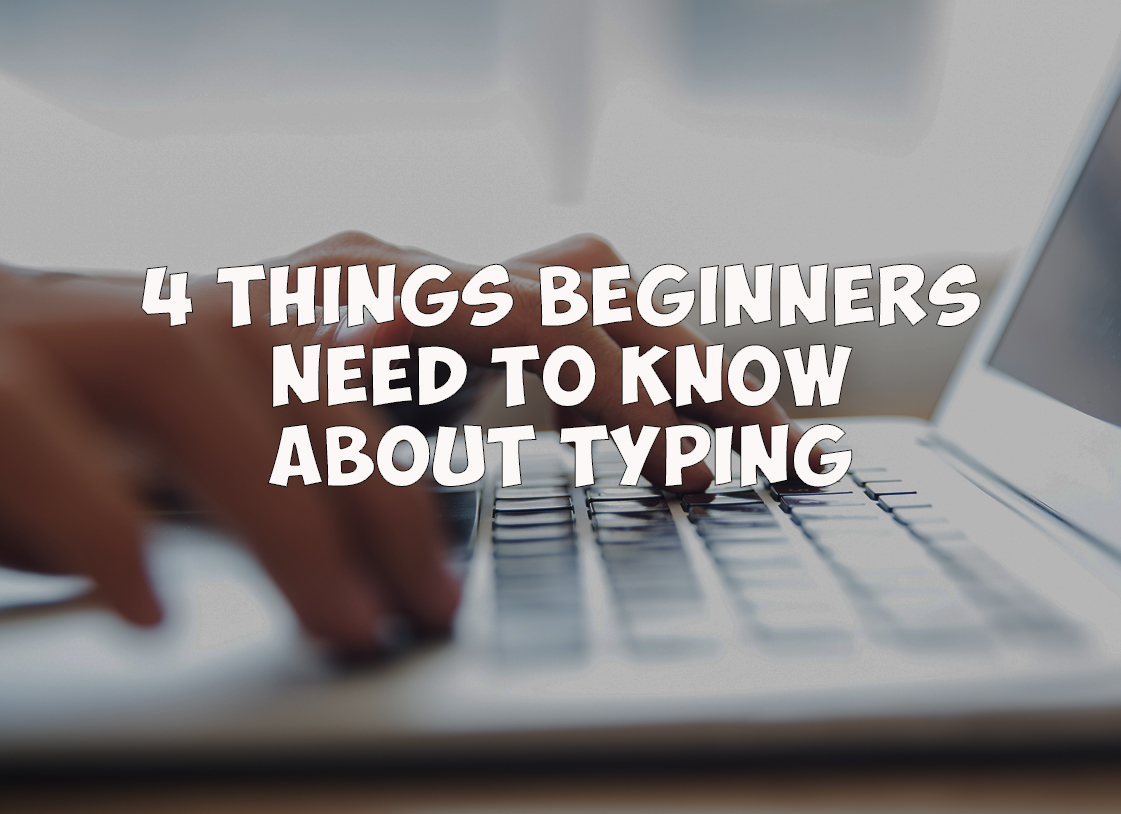
4 Things Beginners Need to Know about Typing
Typing is a very useful skill nowadays. As computers and mobile phones slowly take over the world, it is important for you to learn the fundamentals of typing. When you know how to type, you can do so many things with quite an ease, which is utterly necessary in this increasingly fast-paced world. In schools or businesses, for example, knowing how to type allows you to create your reports and write your essays and papers in no time. When it comes to your personal relationships, on the other hand, typing lets you communicate easily, without much inconvenience.
However, typing can be difficult to master, especially for the non-techy people. Learning how to type may require a lot of time and practice. For some people, they rely on what is called as the ‘hunt and peck’ technique wherein they use their two fingers to press each key on a keyboard individually, instead of relying on their memorized positioning of keys. Although this technique is good for the beginners, it will not help you develop your typing skill at all. You need to learn how to type properly using muscle memory. There is a lot of online typing lessons for beginners out there. You can check them out to help you in your typing endeavor. But before that, there are first some important things that beginners like you need to know about typing.
Proper posture is important
When you start typing, the most important thing that you should be particular about is your posture. Generally, proper posture is so important when you perform any kinds of activities, not just typing. There is a lot of health benefits that come with being conscious of your postures. This includes avoiding back pains and those work-related musculoskeletal disorders such as carpal tunnel syndrome and herniated disc. To avoid these disorders, you should maintain a proper posture when facing your keyboard. You should learn that there are proper angles for your wrists, elbows, and shoulders that you have to consider when you are typing. As much as possible, you have to keep yourself from bending your back all the time. Give yourself an adequate amount of time to relax, stand up, and stretch your muscles. With this, not only are you keeping yourself healthy, but you are also allowing yourself to have increased efficiency and productivity.
Typing requires the use of senses
Typing requires the use of a lot of your senses, most especially your sense of sight and your sense of touch. For you to spike up your productivity when you are typing, you should learn how to make better use of your sense of touch. In addition, learning how to coordinate your eyes and your hands can help you type faster and more accurately. Let your eyes focus on the screen while your hands do the work on the keyboard for you.
It takes time to master typing
As stated, typing can be a difficult skill to master, especially for the non-techy people. ‘Hunt and peck’ is usually the technique used by beginners when they type. However, such technique will not guarantee any improvement in your typing ability and speed. To make your hands quicker than usual when you type, you should invest a good amount of time in learning touch typing. Touch typing is a process in which you designate your fingers on each of the keys on your keyboard to facilitate muscle memory. When you begin typing, you will notice that there are marks placed on keys F and J. These marks indicate the positions of your left and right index fingers. They can help you improve the positioning of your fingers on the keyboard.
Typing can be so much fun
When learning how to type, it is important that you have fun in what you are doing. Learning can be a frustrating thing to learn at first, but it can also be very entertaining and rewarding. Enjoy doing it, and you will see how typing will eventually become something that you can do naturally. If you really feel upset whenever you cannot get the keys right, there are always some people or things that can help you. Typing tutors and online typing lessons for beginners, for examples, are great ways to learn typing while having fun. Remember, you can always easily master anything when you are enjoying your time doing it. So, set all of your frustrations aside and have fun typing!
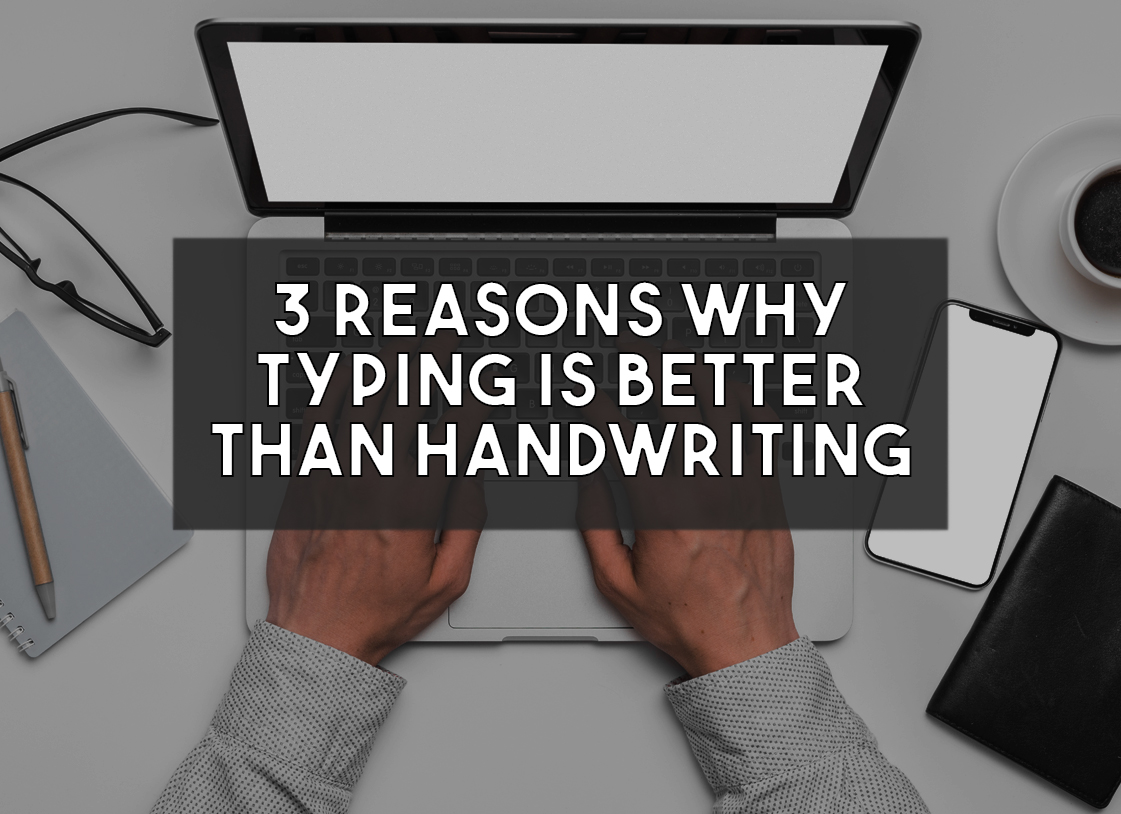
3 Reasons Why Typing is Better Than Handwriting
Back in the old days, people used to write thousands and thousands of words on paper when documenting or weaving information together. Today, however, this has become less and less common. All thanks to technology, people can now create essays, research papers, and other works of literature without having to cramp their hands for writing too many words. Indeed, the inception of typing has made life easier for many people including authors, researchers, students, and more.
Typing or keyboarding is the process of writing or inputting text into a device by pressing keys on a typewriter, keyboard, cellphone, or calculator. Today, typing has become mostly associated with computers and mobile phones. In most jobs nowadays, having some keyboarding skills is a necessity. Most modern-day jobs, whether managerial or rank-and-file, now require people to at least know the basics of typing.
Denise Chambers, an author and teacher, demonstrates this necessity for having keyboarding skills in her book Fundamental Keyboarding Skills: From the Typewriter to the Computer. It is a reference book for both the young and old who wish to learn the fundamental skills of typing. As a teacher who taught keyboarding skills to numerous students, Denise Chambers believes that people can certainly reach their highest potential by learning how to type.
To understand better why this new mode of writing information has become such an important skill to acquire, especially in this day and age, below are some reasons why typing is better than handwriting.
Typing is fast and more time-efficient
Generally, handwriting can be quite exhausting and time-consuming. When you write, there is always the possibility of straining your hand, especially when you write too frequently. Sometimes, you may even suffer from calluses. This, alongside the fact that handwriting can be time-consuming, is the main reason why typing is better. When you write, you tend to spend so much time jotting down your thoughts, writing each and every letter down on your paper. If you try to imagine yourself doing this in a fast-paced work environment, you may find yourself totally pressured and worn out. Especially now that modern jobs require quick and instant solutions to problems, handwriting can be disadvantageous.
So, if you want to avoid delays in your work, typing is the better option. With typing, you can do your work fast. You also no longer need to worry about getting those unwanted calluses from sticking your fingers too much on the pen.
Typing is more environment-friendly
It is commonly known that a major raw material to produce papers comes from trees. The more papers are produced, the more trees are cut down, and the more dangerous it is for the environment. When there are less trees, floods and erosions may become common. It may also cause a major disturbance in the ecological balance, and may force animals to lose their habitats.
Handwriting may be cheaper, and things like handwritten letters may be sweet. However, these things actually pose risks to the environment. Thus, if you to save the trees from being cut down, the ecology from being damaged, and the animals from losing their habitats, then it is better to make use of your computer or mobile phone when writing or communicating. Typing reduces the use of papers. By choosing typing over handwriting, you are contributing to the healing of the environment.
There are less chances for mistakes in typing
Another reason why typing is better than handwriting is that when you are typing, there are less chances for mistakes. This does not mean that you become an impeccable writer, of course. Instead, this simply means that you can easily correct your errors when typing without having to worry about erasures and scribbles. In handwriting, you tend to cross out the words or sentences that you misspell or write incorrectly. As a result, your paper may become disorganized, less presentable, and less readable.
In typing, on the other hand, you can just simply press ‘backspace’, and your misspelled words will then be easily cleared and corrected. In addition, you can also spot your errors quicker when typing because devices now generally have correcting features such as auto-correct and grammar checker.
Overall, typing and handwriting have always been compared to each other. Some people say that one is better than the other, while others believe that both are equally necessary skills to acquire. However, regardless of whether you are pro-typing or pro-handwriting, the most important thing is that you know how to jot down your thoughts and properly weave information together. No matter which method you use, it all boils down to, as Denise Chambers believes, reaching your highest potential!
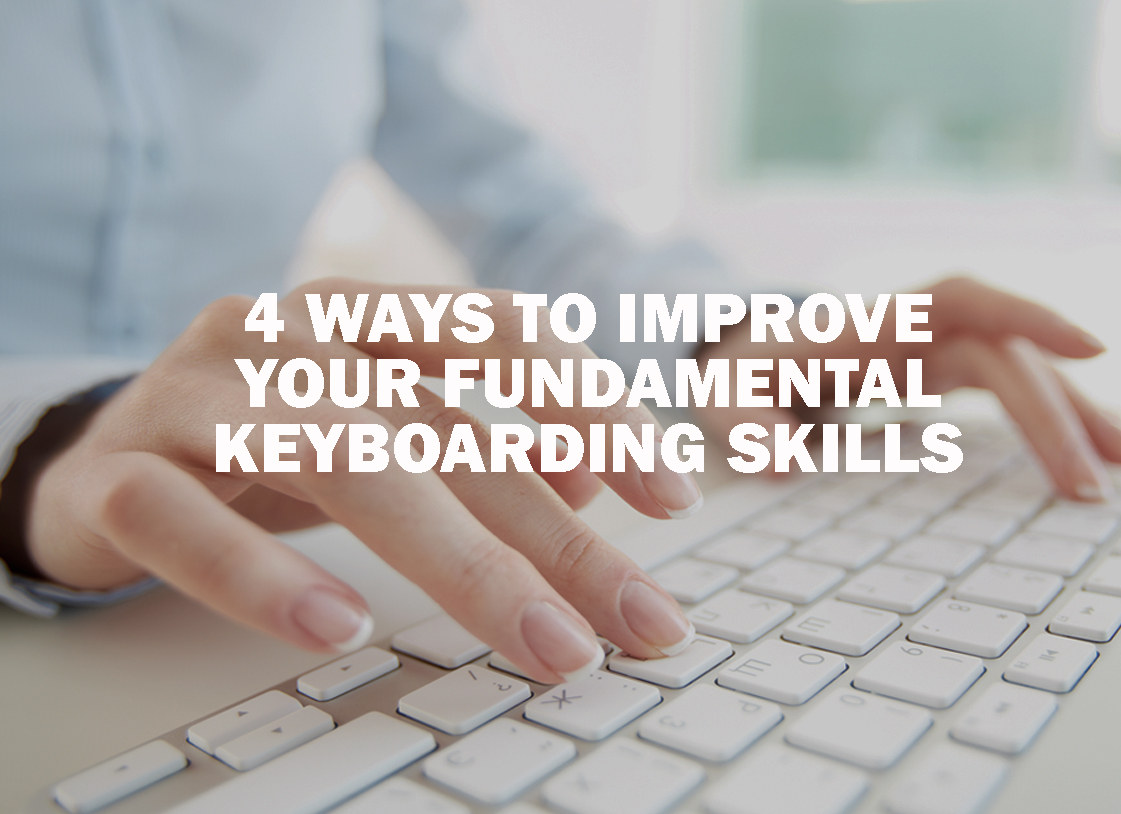
4 Ways to Improve Your Fundamental Keyboarding Skills
Possessing the fundamental keyboarding skills is important in these modern times. Numerous industries are now dependent on computers and their functions. Most jobs around the world today require people to be proficient or at least knowledgeable about keyboarding. More often than not, employers prefer to hire people who can type fast and accurately. Even in schools, possessing some keyboarding skills is also necessary.
Although it seems easy, developing and improving fundamental keyboarding skills is actually taxing. You cannot become a fast and accurate typist overnight. It takes practice and time to improve your keyboarding skills. Nonetheless, there are some measures you can do to make your keyboarding endeavor less onerous. Below are four ways to improve your fundamental keyboarding skills.
Be comfortable first
The first thing that you need to do when practicing your fundamental keyboarding skills is to find your comfort. Generally, people work better when they are more comfortable. The same thing applies for keyboarding or typing. You can learn how to type and improve your keyboarding skills better and much quicker when you are comfortable, especially when it comes to your position relative to the keyboard.
Experts developed a proper typing posture that everyone can and should follow to avoid any injury or deformity. First off, make sure you are sitting up straight. Avoid slouching or hunching over because it can put strain on your discs and cause severe back pain. The keyboard should be placed just below the elbow level so your elbows can be in an open angle. This relaxes your forearms and shoulder while you are typing. In addition, keep both of your feet flat on the floor. Take breaks when necessary and do not overwork yourself!
Familiarize all the keys
Improving your fundamental keyboarding skills requires a lot of familiarization. This ultimately refers to familiarizing all the keys on your keyboard. Alphabets, numbers, and symbols are written or inputted into a computer by pressing the keys on the keyboard. For beginners who are quite unfamiliar with key placements on the keyboard, finding which key to press can be confusing and time-consuming. For this reason, you need to be well-acquainted with all the keys on your keyboard.
To start learning key placements on the keyboard, open a black Microsoft Word document. Begin practicing with the home row keys, the set of keys your fingers rest on when not typing – A, S, D, and F for the left hand, and J, K, L, and ; (semicolon) for the right hand. Work around memorizing these home row keys first, then gradually proceed to the next sets of keys until you familiarize yourself with the entire keyboard. Once you have gotten a decent feel for where the keys are laid out, eliminate the habit of looking down at the keyboard while you type and start practicing touch typing.
Develop a rhythm
Developing a rhythm is essential in enhancing your fundamental keyboarding skills. Rhythm basically refers to the pace at which you type. During your learning process, it is very important to develop and keep a rhythm in typing because this enables you to achieve your desired speed in time.
Remember, however, that what is important in developing a rhythm is to not be in a hurry, but to be accurate rather. Do not feel frustrated whenever you have to pause midway through typing because you forget where a certain key is placed. Speed comes naturally in time and with enough practice. Push your limits for speed. However, at the same time, keep a pace in your speed and be realistic with how fast you can pick up your keyboarding skills.
Practice, practice, practice
This may sound like a cliché or generic advice, but practicing constantly is actually the most important thing that you need to do if you want to improve your fundamental keyboarding skills. As an old aphorism goes, “Practice makes perfect.” Although it is impossible to be actually perfect in anything, practicing on a regular basis can help you enhance your keyboarding skills big time.
If you are a total beginner, regularly practice by getting used to the home keys first to the point where you no longer need to look at both your monitor and your fingers on the keyboard. If you are a more advanced typist, on the other hand, you can create a practice routine wherein your main goal is to develop muscle memory for typing certain kinds of commonly used letter pairings. Overall, if you want to up your fundamental keyboarding skills, practice, practice, and practice. Eliminate all of your bad typing habits and replace them with good ones.
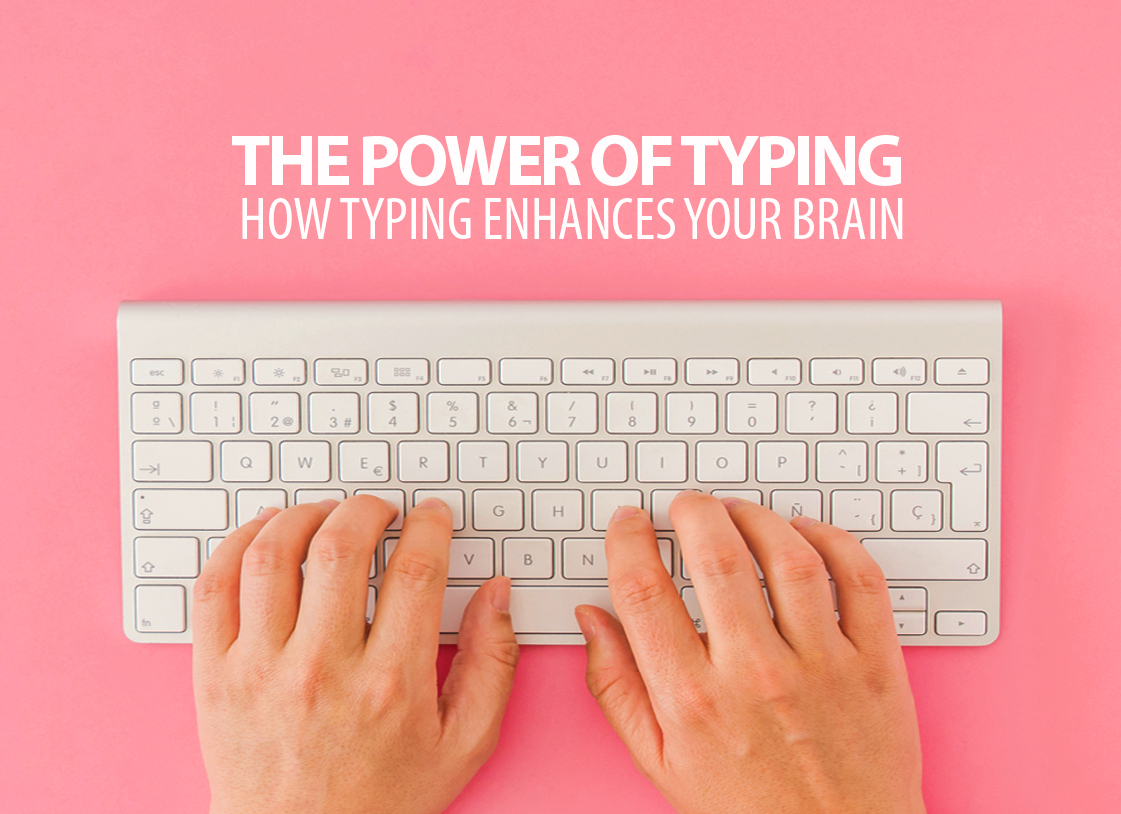
The Power of Typing: How Typing Enhances Your Brain
In the digital age when computers and mobile phones have become ubiquitous machines and devices, typing has become an essential skill that one must learn and master. By definition, typing is the process of inputting text by pressing keys on a typewriter, computer keyboard, mobile phone, or calculator. This text can be in the form of letters, numbers, and symbols.
The development of typing has brought numerous benefits to humans. For one, it has increased the productivity levels of workers in various industries, particularly those who are working white-collar jobs. In the literary world, typing has also been quite beneficial – it has made the job of authors easier, and it has made the production of books easier and faster-paced.
Indeed, typing is such a powerful skill to obtain. There is an enormous power in typing. Power typing does not only make the jobs of humans easier and more convenient, but it also improves their mental capacity and well-being. To learn more about this topic, this article briefly discusses below how power typing enhances the human brain.
Power typing enhances memory
Power typing can enhance your memory because whenever you type, your brain is pushed to remember two things simultaneously: the spelling of the words you are typing and the placement on the keyboard of the keys necessary to form those words. By consistently trying to type correctly to get the spelling of those words right and to press the correct keys, your brain, particularly its memory department, is being exhaustively worked out. The continuous task of remembering two different sets of information at once helps strengthen the neural networks of the brain that control the memory. Hence, power typing indeed has the potential to enhance memory.
Power typing improves hand-eye coordination
Hand-eye coordination is a cognitive skill wherein the visual system of a person is able to coordinate the information it receives through the eyes to control, direct, and guide the hands in accomplishing a certain task such as catching a ball or handwriting. However, not everyone has a good hand-eye coordination. Some people struggle to play a game of catch or to write legibly because they have poor hand-eye coordination. Fortunately, there several ways to solve, or at least, improve this. Power typing, particularly, is one of the most powerful ways to strengthen the connection between eye movement and hand movement because it is a continuous action. The lack of pauses while typing greatly practices both the eyes and the hands in working together at once.
Power typing improves concentration
Since typing is a continuous task that needs the adequate attention of a person, it prompts that person to concentrate and focus. For this reason, it can be argued that power typing also has the ability to improve the concentration of humans. When you are typing, you tend to focus on getting the right spelling of your words, pressing the right keys, and typing what you want to type correctly. Doing all of these tasks simultaneously, of course, requires immense focus. Hence, subsequently, it tends to push your brain to thwart any distraction that may come your way.
Power typing allows smoother flow of thoughts
This benefit is especially important for authors and writers. When you type, particularly when you have already mastered the placement of all the keys on the keyboard, the flow of your thoughts tend to be smoother and more coherent compared to when you still need to write your thoughts down on a piece of paper. This is because power typing is generally faster than handwriting. Thus, the amount of time that you spend on finishing a single word when handwriting can already be spent on thinking and organizing your thoughts when you are typing.
Power typing strengthens the connections between hemispheres
Most people are either right-handed or left-handed. Whether one is right-handed or left-handed is largely up to the central sulcus – the part of the brain that determines right-hand or left-hand dominance. However, some people actually have the ability to use both of their hands simultaneously. Activities like playing the piano or power typing are great exercises that challenge the brain to fight against the dominance of either the right-hand or the left-hand because they require both hands to work together. Scientifically, experts have even found that the brains of pianists or typists, in fact, function differently than most people, as they tend to have a more symmetrical central sulcus.
Without a doubt, typing is a potent skill that brings numerous benefits to the way people think and do their jobs. In essence, power typing is a power. Having the ability to type fast without looking at the keyboard or the keypad is a skill that not everyone possesses, but is greatly advantageous for all. If you want to increase your work pace or if you wish to enhance the capacity of your brain, then power typing is something that you need start turning into a habit now!

Benefits of having Keyboarding skills
Computers are an ubiquitous machine. Their functions exist everywhere. Today, almost everything is practically done with the use of computers – communicating, designing, problem-solution, researching, writing, and more. Particularly, the inception of computers has made it easier to process and store information. Through keyboarding, people can now easily input information for processing and storage on a computer device.
By definition, keyboarding is the process of putting information into various kinds of equipment or device through the use of a typewriter-like keyboard. In other words, it is the activity of typing information into a computer or word processor. In a more specific sense, however, keyboarding is different from mere typing. Typing is just the act of writing individual characters to create text through a device. On the other hand, keyboarding involves not just typing with keys, but also other operations that use a keyboard.
Although keyboarding sounds easy, it can actually be confusing and time-consuming for others, especially for non-techy people. For this reason, many people take the time to practice, learn, and develop some keyboarding skills. Having keyboarding skills is not just all about typing right. There are plenty of benefits that people can get from mastering the keyboard. This article is especially dedicated to listing down the important benefits of having keyboarding skills.
Education Benefits
High school and college students do most of their work on computers nowadays. Commonly, they do internet research, essays and papers, excel reports, and group presentations through a computer device. All these things involve the use of a keyboard. For this reason, it is important for students to master keyboarding. Being an expert at keyboard keys and operations will practically make it easier for students to finish their tasks, especially at times when they are struggling to meet deadlines. More so, having keyboarding skills will allow them to focus fully on the tasks at hand. They will have more time to spend thinking about ideas and organizing their thoughts instead of wasting a few precious seconds on hunting and pecking. This, then, will largely improve the quality of the students’ output.
Career Benefits
Much like at school, keyboarding is also an essential skill at work. Regardless of whether one works an administrative or managerial job, he or she is most likely to do data entry, type up emails, write reports, work on electronic documents, and do pretty much everything that involves the use of a computer. Because of this, having keyboarding skills is a great head start for people who want to make it big in the corporate world. Generally, employers look for people who can do the job fast and easily because time is money and speed always counts. People who can type fast and finish their tasks in no time have better chances of getting hired compared to those who still have to hunt and peck. Moreover, workers with great keyboarding skills are most likely to get rewarded with more work or better-paying positions.
Social Functions
With the advancement of technology, communication has become more and more computerized. Today, people are already largely communicating via text message or the internet. They no longer need to write their letters on a piece of paper and travel to the post office. They can just simply type their message into a computer device and send it via the internet for the receiving party to get it in an instant. Indeed, mobile phones and the internet have undoubtedly taken over the communication process on a large scale. For this reason, people who are slow to adopt to these forms of communication may miss out on a lot of opportunities to communicate not just with their friends and families, but also with other people from many parts of the world. In order to take full advantage of these faster forms of communication, people should develop keyboarding skills that can match that of the rest. In the digital age, having great keyboarding skills is an important component of social development, especially for the young generations.
Learning Assistance
Aside from students and workers, keyboarding is especially important and helpful for people with physical impairments and learning difficulties. For example, for the blind and visually impaired, developing keyboarding skills is necessary because this allows them to navigate a keyboard without using their eyes. By doing so, they can also write quickly and accurately without the need to form letters by hand, whatsoever. For children with attention deficit hyperactivity disorder (ADHD), on the other hand, keyboarding helps in breaking down tasks into manageable steps. Because keyboarding facilitates muscle memory, children with ADHD will be able to focus on the main task required of them without feeling overwhelmed by the tangential tasks.
Overall, having some keyboarding skills is important for various reasons: they help people finish their daunting tasks in no time, without breaking much sweat; they allow people to communicate faster; and they make learning more accessible to the less privileged. Indeed, having keyboarding skills is more than just typing right. It also makes people type freely, readily, and cheerfully. As computers and keyboards increasingly establish their significance, it is important that people acquire the skills necessary to master them.
|
